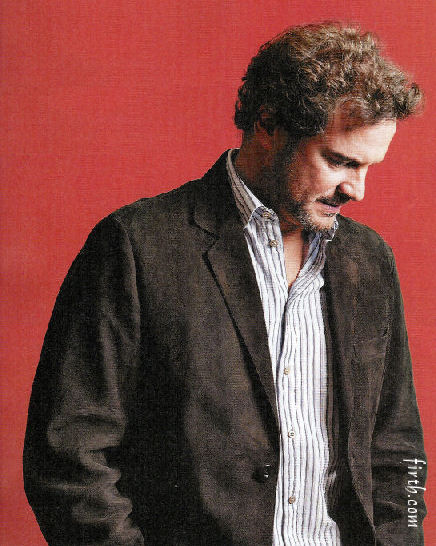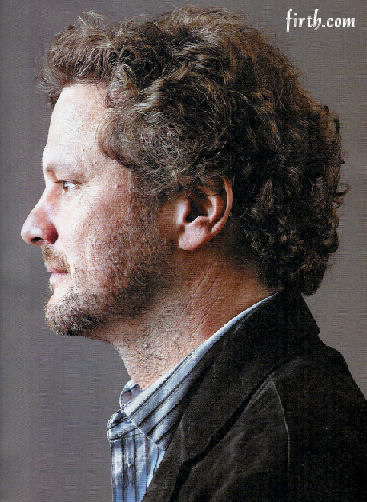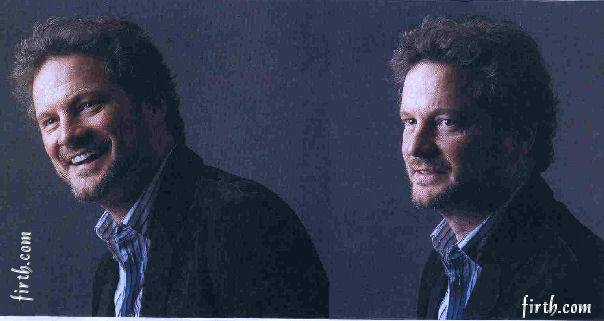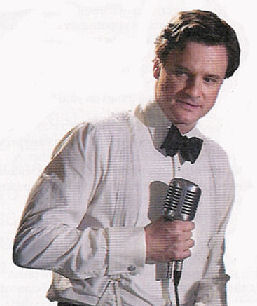Without Prejudice
For a decade, Colin
Firth has been Britain’s most lusted after leading man. But in truth he
is much more complex than the sex symbol tag suggests. He talks to
Peter Ross about the shock of fatherhood, the highs and lows of acting,
and why Tony Blair’s religious beliefs make him want to jump in a lake
|

|
"Cool!" beams Colin
Firth. "That sounds very reasonable.” He looks almost absurdly
grateful, like a prisoner on death row granted a last-minute reprieve
on the condition that he sleeps with the warden’s beautiful daughter.
Firth is pleased because I have solemnly promised at the outset of our
interview not to ask any questions about Pride And Prejudice or Bridget
Jones. These are the projects with which he is most closely associated,
and which have defined him in the public mind as a piece of prime posh
totty whose turbulent emotions are kept in check by good old-fashioned
British reserve.
All rot, of course, but nevertheless almost every profile of him
written in the last decade—and there have been hundreds—has been a variation on this theme. The
journalist who spoke to him just before me concluded by asking, "So
what’s a Texan doing playing Bridget Jones?" and the only thing that
prevented Firth from responding to this by falling to the floor and
writhing around with blood streaming from his eyes was (a) the rugs in
this London hotel room are pretty expensive, and (b) he’s too polite a
chap to make a fuss. Nevertheless, he is delighted by the prospect of
talking about something—anything!—other than Mr bleeding Darcy and
Renée sodding Zellweger. "That would be very cool," he says.
"Thank you very much."
He is sitting on a sofa in a room of The Dorchester, a gaff so chintzy
that the staff have lace frills round their faces, and so hoity-toity
that a little man follows you around sweeping up your dropped aitches.
Firth has been here all day, promoting his new picture. The ambience is
hotel zen—calm to the point of numbness. It is 5pm
and I am Firth’s last interview of the day, all that stands between him
and soup and a salad. He is wearing jeans, scruffy trainers, a striped
shirt, and the beginnings of a beard. He is tall and handsome, as you
know, and thinks about what he is going to say before speaking. He
tries to make an interview into an actual conversation rather than an
empty ritual of obvious questions and unsurprising replies, and while
this can lead to waffle and waste precious time, it’s nice to see him
behaving like a human in the dehumanising context of a press junket;
it’s a mark of the man—decent, intelligent and determined to
make life a little more bearable.
We begin by discussing his film, Where The Truth Lies. Directed by Atom
Egoyan in the noir tradition, it’s a complicated story about sex and
murder. Firth plays Vince Collins, an English actor in Seventies Los
Angeles who used to be one half of a hugely successful Fifties comedy
duo, his former partner—Lanny Morris—being played by Kevin Bacon. Both men
are planning to publish explosive memoirs of the decadent years they
spent together, and what everyone wants to know is what really happened
to the young girl who was found dead in their New Jersey hotel room
back at the height of their fame. The film’s theme is the gap between
public and private self.
All famous people experience that disparity, and Firth is
no different. "The way the public see me doesn’t seem to be very
coherent," he says. "Unless it’s just as Mr Darcy or the guy who does
Bridget Jones, I don’t think there’s a finite image. The person that I
read about in newspapers, who looks back at me, is an unlikely montage
of disparate things, pieced together from one phase of my career
attached to another. And actually, that’s fine by me. I don’t mind it
at all." In other words, he doesn’t want people to know who he is. He
would rather they were confused.
If he will allow it, though, I’d like to clear something up. One of the
great Firth myths is that he is modest and self-effacing, and he nods
when I mention this, dismissing it as "a load of British shtick". It is
essentially the Colin Firth act that he slips into in public. But the
truth is that acting requires enormous amounts of self-belief, even
arrogance, and he certainly has those personality traits.
"Yeah, it requires huge ego," he says. "I remember one of my
grandfathers, who was a minister in the church, said that he had to
have quite a considerable ego to get up in front of people, tell
stories and preach to them. He said that’s what got him up there, and
over his nerves about being the centre of attention."
This is typical Firth, making a point about himself by referring to his
family background. He does it a number of times during our relatively
short time together; he clearly believes in the importance of
bloodlines and a certain level of genetic predestination.
Anyway, he is not finished talking about ego.
 "I
remember at drama school it struck me that the great extroverts were
not necessarily the best actors. Very often the best actors were not
that sure of themselves socially; they could be very quiet and retiring
people, and the stage was the place where everything got released."
Although too fond of his British shtick to say so, he is talking about
himself. The young Firth who grew up in Winchester and then attended
the Drama Centre in London, does seem to have been something of a
loner, uneasy in a crowd. But as he points out, being like that "is not
inconsistent with having a lot of vanity and really, really wanting to
succeed for your own sake." "I
remember at drama school it struck me that the great extroverts were
not necessarily the best actors. Very often the best actors were not
that sure of themselves socially; they could be very quiet and retiring
people, and the stage was the place where everything got released."
Although too fond of his British shtick to say so, he is talking about
himself. The young Firth who grew up in Winchester and then attended
the Drama Centre in London, does seem to have been something of a
loner, uneasy in a crowd. But as he points out, being like that "is not
inconsistent with having a lot of vanity and really, really wanting to
succeed for your own sake."
Success came quickly. Firth was the star of the Drama Centre, known for
his intelligence, poetic sensibility, and willingness to immerse
himself in characters. When they staged Hamlet, he played the lead. He
was talent-spotted and cast in the West End production of Another
Country, the play which had already launched the careers of Kenneth
Branagh, Rupert Everett and Daniel Day-Lewis. Firth had arrived.
He appeared in the 1984 film version of Another Country and quickly
notched up TV and film work which saw him cast alongside some legendary
actors. In Camille, he worked with John Gielgud, and appeared in the
1986 mini-series Lost Empires, the last television programme Laurence
Olivier ever made. What must it have been like for a young actor in his
mid-20s to act with people of that calibre?
"Stunning," he says. "It made me feel I had achieved something,
although I hadn’t achieved very much in my own right, just to be in the
company of the most luminous names in my profession. There was nobody
more dazzling than Laurence Olivier, the most celebrated actor of the
century. And I was treated, on the whole, with equality. Acting in this
country is a very egalitarian process; there is that feeling that one
is in a company. Olivier used to call me ‘partner’ ..." Firth breaks
off and laughs, "...partly because he couldn’t remember my name. He
asked me to call him Larry."
Back in those days, Firth felt differently about his talents. "In some
ways I find acting more difficult now than I used to," he admits.
"There were certain things that were easier because youth gave them to
me for free. One was the ability to suspend disbelief, to believe
whatever you want to believe. And that can produce the arrogance, which
we were talking about. I was not nervous when I went on stage in my
early 20s; I am now. When you are young, you go on stage thinking,
'This is my right. How can it go wrong? And what does it matter if it
does—I’m indestructible.' The the realities
of life tell you after 20 years that you are totally destructible, and
you have seen the destruction, and you know what can go wrong. That is
the sort of thing that can interfere with your work."
At this point, I hazard a guess that he is referring—in partVto his feelings about becoming a
father. It’s true for a lot of men, I think, that when they become a
parent, a sensation of constant low-level fear enters their lives; a
lot of anxiety and pressure to succeed and be dependable, to live up to
that word: dad. When you have a child, you are confronted with who you
really are, and for an actor—a person whose work rests upon their
ability and willingness to flit blithely from identity to identity—that can be difficult. In 1990, Firth
had a son, Will, with Meg Tilly, the Canadian actress whom he met on
the set of Valmont.

"That was the
biggest thing," he says. "I went through a brief period
after my first child was born when I felt even more bullet-proof. It
was so important to me that it felt like nothing else was important,
and so I felt like nothing else could touch me. I couldn’t possibly be
intimidated by a social situation, and my career just didn’t seem
important.
"But then you find out all sorts of things about yourself, as you
become a parent, and start to make mistakes, and start to realise how
much depends on your judgement at every step in terms of what your
child’s future is going to be. Those things start to make you feel
vulnerable. You realise that the world is quite scary and you have a
huge responsibility to make it better for someone other than yourself.
It turned my life completely upside down, and my feeling of
invincibility pretty well ended around that time.”
I ask him to please tell me one surprising thing which he learned about
himself during that period. He takes his time replying, I think because
he is deciding how honest to be.
"Well," he says, "before I had a child I had thought I was a person who
had a reasonable capacity to care for other people. But then I realised
that it had basically all been about me up to that point. All my
pursuits. I enjoyed not having ties, certainly not having any that I
felt I couldn’t undo. And having a child is the one thing that you
categorically and clearly cannot undo. It was a shock to have something
that was bigger than me, bigger than my own ego. That my peace of mind
and happiness depended on the well-being of someone else was a huge
shock. That hadn’t happened before. I thought I had loved people
sufficiently that their happiness was equal to my own. But it wasn’t.
It was nowhere near."
Do not take from this that Firth is entirely self-centred. He is, for
example, very politically engaged; he has campaigned for rights for
asylum seekers, and is a director of Progreso, the ethical coffee chain
which gives growers in the third world a percentage of the profits.
Anyway, his feelings about fatherhood began to affect the way Firth
acted. He had been trained according to the Stanislavski system which
required him to immerse himself in roles, and his own natural
inclination was to strive for maximum truthfulness, but after the birth
of his son he was increasingly unwilling to become the characters, to
feel what they felt. The crisis came during the filming of Hostages,
the 1993 docu-drama about John McCarthy’s kidnap and imprisonment by
Islamic terrorists, which seems to have been filmed around the same
time as Firth’s relationship with Tilly was coming to an end. "I
thought, 'Why am I doing this silly job where I am entering into
someone else’s shit? It’s ridiculous. I’ve got my own issues to deal
with here, and I’m supposed to pretend to be this guy suffering.'"
Although Firth only became truly famous three years after this point,
with his iconic Mr Darcy, my sense is that his commitment to acting has
never been quite the same since. I hope any actors reading this will
forgive me for saying so, but he’s a bit too smart for the job. He
seems more naturally a creator than an interpreter of work. Five years
ago he published a promising short story as part of Nick Hornby’s
Speaking With The Angel collection, and has written more fiction since,
although he prefers to write for his own pleasure rather than with a
view to publication. He finds writing calming, but if he knew it was
going to be published then he would get stressed about deadlines, and
it would lose its therapeutic quality. Nevertheless, as he says, "the
writing itch is growing, the acting itch is diminishing, and the
possibility of doing something on the other side of the camera has
raised itself."
Acting isn’t coming naturally to him at the moment, but he is bringing
up two small boys—Luca and Mateo—with Livia Giuggioli, his wife of eight
years, and so the time isn’t really right to swap the Winnebago and
film star salary for the writer’s garret and relatively paltry royalty
cheque. Plus, he enjoys the company that acting brings. Firth is
Hamletishly given to brooding and introspection, so being on his own
isn’t good for him; that’s partly why he wasn’t at all at ease when
living in the Canadian wilderness with Meg Tilly, and why he will be
sticking to acting for now. He puts it simply: "The solitude and
self-discipline of writing usually can’t compete with the allure of
getting a paid job with lots of mates."
He grew up in a very well-read home. Both of his parents were
lecturers. "Books were very much encouraged, and my parents read a
great deal. Different strands of the family pass that down. My mother’s
mother was very literary."
 "You knew her?" I ask. "You knew her?" I ask.
"Yes, I knew all my grandparents. They were all there until I was
about
35. It was extraordinary. She married a man who was completely
self-educated—a butcher’s son who ended up as a
doctor. They beat the crap out of him at school for being left-handed
so he left and did it all himself. Education has always been of
importance in the family. They were a bit freaked out at first when
they realised I was not going the conventional route."
Firth used to be a bit paranoid about having never gone to university;
he felt he was lacking something, but is over it now. Perhaps mindful
of his autodidact grandfather, he uses acting jobs as a way of
educating himself. While filming Apartment Zero in Argentina, he
learned all about the history of the country. He had never read any
Jane Austen, or indeed been that interested in English literature,
until he signed up to Pride And Prejudice. Even after filming had
finished on Conspiracy, in which he played one of the Nazi leaders
planning the extermination of the Jews, he continued to research the
Holocaust. "I suppose it’s a weird way to study," he says, "but I enjoy
the homework."
He’s interesting, Colin Firth; much more interesting than I thought he
was going to be before I met him. His mind and conversational range are
sprawling, swampy. He could talk the hind legs off a donkey and make it
fear for the other two. He is the sort of man with whom one could have
a tremendous 3am conversation after seven pints and a half pizza
supper. Trying to get his measure in a hotel room in less than an hour
is an impossible task, like attempting to reduce the Everglades to a
nice water feature. However, if pressed, I’d say that the key to
unlocking him is to understand that he’s all about movement and change.
When he was 12, his family lived for a year in St Louis, Missouri. They
made various lengthy road trips from the city, and as a result Firth
saw much of the American landscape—its mountains and canyons, skyscrapers
and neon streets—at a very impressionable age. "It was
absolutely amazing and very wild," he says. "I had been living in a
little suburb in Hampshire; I came back feeling very much at home in
that world of travel, and have felt very itinerant ever since. I’ve had
a lot of friends who are not English; my partners, girlfriends, have
rarely been English. That’s not been conscious—will not accept English girls—it’s just happened that way."
Although Firth—like his rival for parts, Hugh Grant—often seems to represent a certain
old-fashioned Englishness on screen, he himself does not feel
especially English. He is a jumble of English, American, Canadian and
Italian, and seems to like it that way. He is opposed to certainty of
any kind—"I have less and less patience with any
kind of moral absolutism" is a typical Firth sentence—and can’t stand politicians who are
convinced that their approach is correct, particularly if that point of
view is rooted in faith. "So I have a big problem with Mr Blair’s
religious convictions. I think they are very dangerous. And let’s not
even talk about the White House."
One set of Firth’s grandparents were Methodist missionaries, but the
atmosphere when he was growing up was always very progressive, and he
was raised to be suspicious of religious fundamentalism. What was
important was to debate, to discuss, to bounce opinion around. "I think
questions are all you’ve got in life in the end," he says, and can’t
even tell me if he believes in God or is an atheist "because those
words are such absolutes that I find any discussion of them meaningless
until we both know what we are talking about."
You could scoff at this, of course, and say that Firth’s attitude is
wishy-washy liberal garbage, and that if we all thought like him,
nothing would ever get decided; that may very well be true, but it
makes him an interesting man. More, his ability to see every side of an
argument, to put himself in someone else’s shoes, is—I would think—what has sustained him as an actor even
as his willingness to feel the emotions of his characters has
diminished. The 12-year-old who went to America, and felt at home as he
hurtled along the freeway, is now a 45-year-old with a protean
imagination. It will be interesting to see what he does with it in
future.
It is almost 6pm when I leave the hotel room. "Thanks for not being
obvious at any point," he says as I’m going out the door. Likewise,
Colin, likewise.

Where The Truth Lies is released on December 2
|



 "I
remember at drama school it struck me that the great extroverts were
not necessarily the best actors. Very often the best actors were not
that sure of themselves socially; they could be very quiet and retiring
people, and the stage was the place where everything got released."
Although too fond of his British shtick to say so, he is talking about
himself. The young Firth who grew up in Winchester and then attended
the Drama Centre in London, does seem to have been something of a
loner, uneasy in a crowd. But as he points out, being like that "is not
inconsistent with having a lot of vanity and really, really wanting to
succeed for your own sake."
"I
remember at drama school it struck me that the great extroverts were
not necessarily the best actors. Very often the best actors were not
that sure of themselves socially; they could be very quiet and retiring
people, and the stage was the place where everything got released."
Although too fond of his British shtick to say so, he is talking about
himself. The young Firth who grew up in Winchester and then attended
the Drama Centre in London, does seem to have been something of a
loner, uneasy in a crowd. But as he points out, being like that "is not
inconsistent with having a lot of vanity and really, really wanting to
succeed for your own sake."